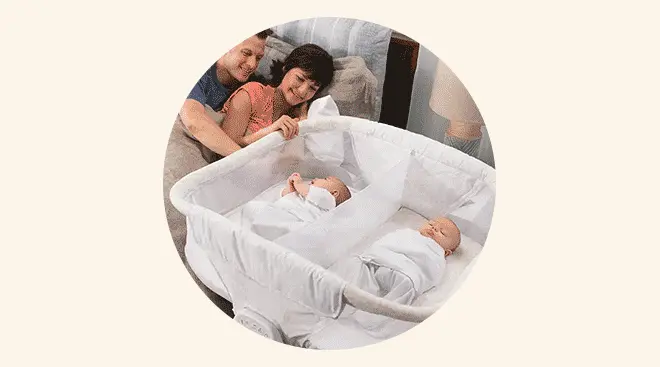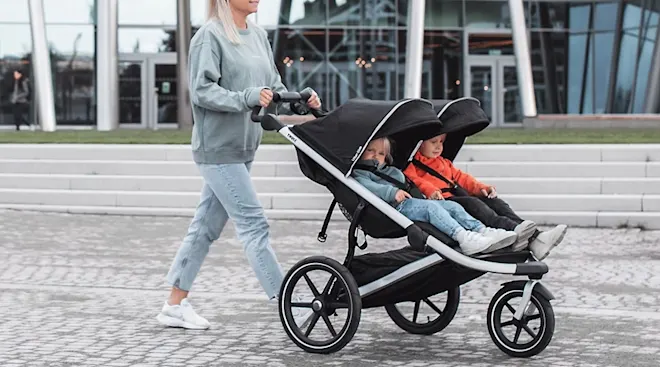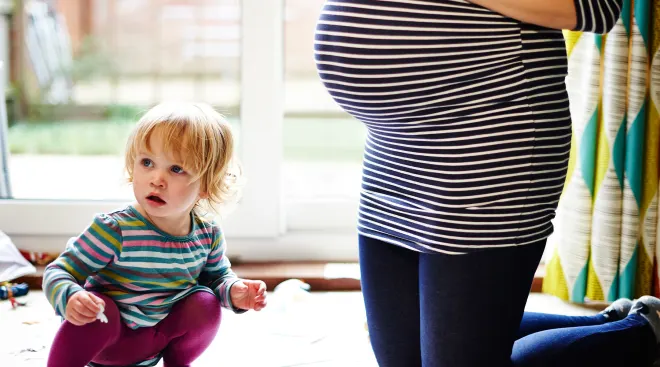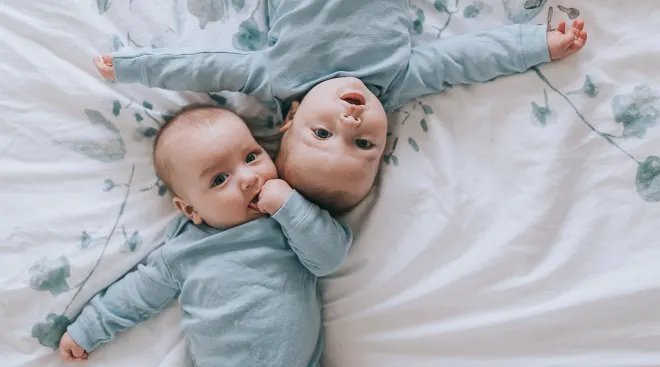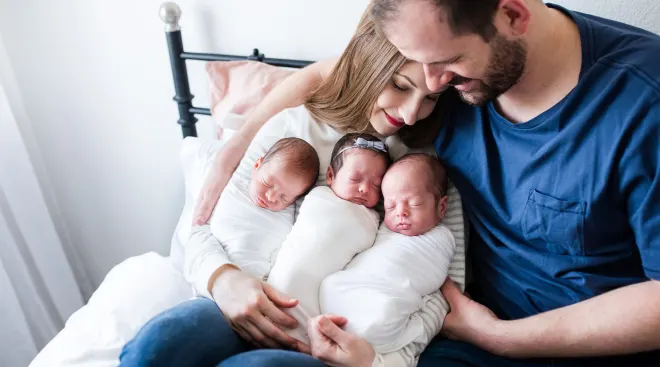What Are Irish Twins?
So you’ve got two kiddos close in age? If someone has playfully referred to your pair of peanuts as “Irish twins” it may have caught you off guard—especially if you’re not Irish. And they’re not twins. So what are Irish twins, exactly, and how many months apart must they be to earn this lighthearted label? We’re sharing everything you’ve ever wanted to know about having Irish twins—including the bountiful joys and plentiful challenges.
While you’ve likely heard the phrase before, you probably haven’t given it much thought. So what are Irish twins? Are they actually twins? (Spoiler alert: They’re not.) The term, which is far less common today than it was in years past, is sometimes used to describe two children born to the same mom within a span of 12 months or less, though some people consider siblings born within 18 months of each other to be Irish twins too. According to a bit of quick math, this means the mom had a baby and then got pregnant again within two to three months—or as many as nine months, when the term is used more loosely.
Of course, there’s one key difference between Irish twins and literal twins: Irish twins are born from two completely different pregnancies, whereas both identical and fraternal twins are born from the same pregnancy. (Identical twins come from a single fertilized egg that splits in half, while fraternal twins occur when two different eggs are fertilized simultaneously).
So, how many months apart are Irish twins? It’s technically possible for two siblings to be as close as 9 or 10 months apart. After your pregnancy comes to an end, you’ll start ovulating again before you have your first postpartum period. That means having sex even once without protection could lead to a pregnancy, even if it’s as soon as three to four weeks after the birth of a child.
Many moms believe that breastfeeding alone can prevent them from getting pregnant soon after childbirth. While it can’t be considered a foolproof method of contraception, there’s some truth to the idea that exclusive breastfeeding can provide a bit of natural spacing between siblings. Brittany Robles, MD, an ob-gyn and personal trainer, says, “Breastfeeding can act as a form of contraception as it forces your body to continue producing the hormone prolactin. This hormone actually suppresses your body from ovulating, which is how it can act as a natural form of birth control.” But, she says, “if you’re hoping to avoid getting pregnant again right away, it’s best to use another, more reliable form of birth control, such as progestin-only pills, Depo-Provera injections, an IUD or the implant.”
Many people today don’t flinch at the use of the term “Irish twins” to describe kids born close together. In fact, some families use the term with pride, recognizing that their close-in-age kids do, in fact, share many of the same characteristics as duos who are truly twins. But the original Irish twin meaning was less benign. At the turn of the century, “Irish twins” was used as a derogatory term aimed at the large waves of Irish-Catholics immigrating to America. Because using birth control was forbidden in their faith, these families were often large, and it was common for them to have siblings who were very close in age.
Is the term “Irish twins” offensive?
Despite the origin story, there’s no straightforward answer to this question. It may not be meant in the same degrading way as it was when the phrase was first coined, but some people may still find the term “Irish twins” offensive. So if you’re speaking to a family who has kids close in age, it’s best to avoid it. If you need a medical term to use as a substitute, back-to-back births are referred to as “short-interval pregnancies” at most ob-gyn practices.
If you’re a parent of Irish twins, you understand what it’s like to watch your baby morph into a big kid overnight when you give birth to another newborn. And there’s nothing sweeter than seeing your baby (yes, your big one!) fall in love with your new addition. But there can be many other wonderful things about having Irish twins. In most cases, both kids hit similar phases at the same time (after that tumultuous first year, of course) and are often into the same things, like TV shows, hobbies and toys. They’ll eventually be able to play together and entertain each other, freeing up some much-needed time for you.
You also may be able to move on from the challenging pregnancy phase faster if you have consecutive babies, rather than putting your body through a roller coaster of hormones and weight fluctuations a few years apart. Of course, you may still decide to have another baby again down the line, but there are many instances where it may be ideal for you to get pregnant again soon after giving birth. Here are a few key considerations:
• Your age. If you’re starting a family in your late 30s or early 40s, having kids close in age may help ensure you’re able to have more than one child, if you desire.
• Fertility issues. If you’ve struggled with infertility in the past, you may want to start trying to get pregnant again sooner rather than later after childbirth, in case it takes a long time to see those two pink lines again.
• Career. In some cases, you may want to have your children close together to shorten or consolidate the gap in your career. This could be the case for those with particularly demanding professions like physicians or professional athletes.
Real moms speak: What’s the best thing about raising Irish twins?
Irish twins mean double the love. We asked parents to share the greatest benefits of having two babies close together. Here’s what they had to say:
“It’s always a blessing to conceive and give birth to a healthy baby! Always. I’ll never take that for granted. But now that they’re 1.5 and 2.5, they’re starting to become best friends and have the same interests… They’re also basically potty training at the same time and we gave them the lifelong gift of being best friends. No need for a play date, since they have each other.” —Stephanie R., mom to 1-and 2-year-old toddlers
“It’s been the best. They’re best friends. He takes care of her, and they never fight. They’re very close.” —Melike A., mom to Adam and Yasmin, 20 months apart
“The first couple of years are hard, but they literally are a blur. It’s only once they’re past the toddler stages that you realize how much work and effort it actually took to have two babies at the same time. I absolutely love that my kids are so close in age because they are best friends and playmates. I wouldn’t recommend spacing them further apart. When we were done with diapers, we were done. When we were done with bottles and pacifiers, we were done. I can’t imagine being done and then going through all of the stages again years later.” —Michelle G, mom to Declan, 6, and Katharine, 5
The Challenges of Having Irish Twins
Having kids born close together is a delight, and most parents feel it’s amazing to watch them grow up together. But having Irish twins can also make for a harrowing few years at the beginning. First, consider what your body goes through with short-interval pregnancies. While it’s possible to have two back-to-back pregnancies, doctors recommend a slightly longer timeframe between pregnancies, if possible. “It’s generally not recommended to get pregnant within 12 months of a c-section delivery and six months of a vaginal delivery,” says Zaher Merhi, MD, an ob-gyn and reproductive endocrinologist. In some cases, back-to-back pregnancies can increase the risk of preterm birth, uterine rupture and other potential complications, according to the Mayo Clinic.
Once you’re in the midst of raising two babies at once, it’s easy to experience burnout, especially if you don’t seek help. Merhi points to a slightly higher possibility of depression in moms with kids close in age due to stress and exhaustion.
Finally, it’s wise to consider the life-long financial implications of having Irish twins. Sure, shelling out for two cribs and two boxes of diapers is rough, but what about paying for two preschool or daycare tuitions (and, for that matter, two college tuitions) at roughly the same time? When it comes to expenses, raising Irish twins is strikingly similar to having actual twins.
Real moms speak: What’s the hardest thing about raising Irish twins?
The struggle—and snuggle!—are both real when you have two little ones to simultaneously parent. Here, moms share the biggest challenges of having Irish twins:
“Imagine giving birth when your 11-month-old is just learning how to walk, but still needs to be held all the time and can’t follow any direction. My poor baby hardly had a “babyhood” because I was just in survival mode! Many people said it was more difficult than actual twins they worked with because they’re close but still not developmentally the same. The older kid is frustrated because they want to do more, and the little one can’t quite keep up.” —Stephanie R, mom to 1- and 2-year-old toddlers
“The first two to three years were exhausting. Two diaper bags, two cribs, two kids randomly waking up in the middle of the night. Then potty training with one while the other was an infant.” —Michelle N, mom to Michael and Maddie, born 12 months apart
“I would say there is a lot of mom guilt. And it’s hard being extremely pregnant with a 10-month-old.” —Sara L., mom to Lachlan and Gwenivere, 11 months apart
No one ever said parenting two little ones was easy, especially when they’re at slightly different developmental stages! Below, we’ve included some tips to help you survive and thrive while raising your Irish twins:
• Make time for yourself. “Increase their play time together and make sure you have a nanny or other help at times,” says Merhi. “It’s important to take relaxation time for yourself.”
• Share duties. Elizabeth Hicks, co-founder of Parenting Nerd, says, “There’s no shame in delegating tasks and dividing duties with your partner. Raising kids is a shared responsibility.”
• Develop schedules and routines. An important tip that’ll keep your mind sane while raising two babies at once is developing schedules for them, says Hicks. “When you have a proper routine, it will help you and your partner to function in the best possible way. This will also help children to acknowledge what’s going to happen next.”
• Maintain separate expectations. If there’s one thing that’s true of Irish twins, it’s that every child develops along their own unique timeline. They may hit certain milestones at varying times, and their personalities may be very different. Keep that in mind as they grow, and allow them each to explore activities and interests they’d like to try.
Irish twins are a blessing, but back-to-back pregnancies can take a toll on your body, mind and budget. Pulling double duty with two tots won’t be easy either. But there are undeniable benefits to having kids close together: Those squabbling siblings will be instant best friends—and you’ll have two littles ones to love on. Win-win.
Please note: The Bump and the materials and information it contains are not intended to, and do not constitute, medical or other health advice or diagnosis and should not be used as such. You should always consult with a qualified physician or health professional about your specific circumstances.
Plus, more from The Bump:
Brittany Robles, MD, is an ob-gyn and NASM-certified personal trainer. She received her medical degree from Ross University School of Medicine in Barbados.
Zaher Merhi, MD, is an ob-gyn, reproductive endocrinologist and the founder and medical director of Rejuvenating Fertility Center (RFC) in New York and Connecticut. He earned his medical degree at the American University of Beirut.
Elizabeth Hicks is the co-founder of Parenting Nerd, a community devoted to helping parents navigate the journey that is child rearing.
Mayo Clinic, Family planning: Get the facts about pregnancy spacing , December 2022
Learn how we ensure the accuracy of our content through our editorial and medical review process.
Navigate forward to interact with the calendar and select a date. Press the question mark key to get the keyboard shortcuts for changing dates.


































